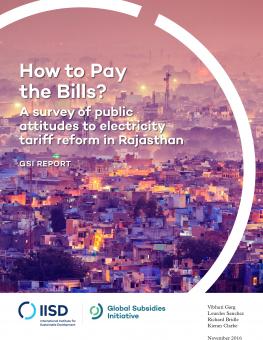
How to Pay the Bills? A survey of public attitudes to electricity tariff reform in Rajasthan
This report presents the findings of a household survey that sheds light on the attitudes of electricity consumers toward tariff reform in the State of Rajasthan, India.
Electricity distribution utilities in India are currently unable to cover the cost of their operations from the sale of electricity.
The absence of cost recovery has serious implications for the financial health of the electricity sector: it undermines efforts to maintain investments in transmission and distribution systems (and therefore to expand rural electrification), deliver reliable power, and support the development of renewable energy. Tariff reform is key to solving these issues; however, tariff reform can be unpopular.
This report presents the findings of a household survey that sheds light on the awareness and views of different socioeconomic and geographical groups regarding electricity subsidies and electricity tariff reform. It concludes that there is a significant lack of awareness of the existence and size of electricity subsidies, although subsidy reform is a tough sell. At the same time, surveyed households recognize that higher power prices would have significant negative impacts on their daily activities, and some of them show willingness to pay for a more reliable power supply.
Participating experts
You might also be interested in
Increased Support Needed to Achieve India's Clean Energy Goals
India is on track to achieve many of its 2030 clean energy goals but needs to step up government support measures to accelerate the deployment of offshore wind, electric vehicles, and green hydrogen, according to a new report.
Budgeting for Net Zero
This study estimates the cost gap for battery energy storage systems (BESSs), offshore wind, solar photovoltaic (PV), electric vehicles (EVs), and green hydrogen (GH2) to inform government support.
India Faces Clean Energy Challenges as Energy Demand Soars and Global Fossil Fuel Subsidies Rise
New research finds the global energy crisis and increasing energy demand have pushed India's energy subsidies to a 9-year high.
Lithium-Sourcing Roadmap for India
This report aims to provide a strategy to guide policy-makers in sourcing lithium responsibly to promote clean energy manufacturing in India, with the broader aim of supporting low-carbon economic growth, creating equitable jobs, and helping to mitigate climate change impacts.